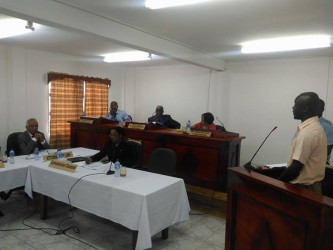Murder accused Basil Morgan yesterday said that the spread of the fire which led to the death of 17 inmates at the Camp Street prison could have been the result of water being cut from the facilities by prison officials.
Morgan, when questioned by Commission of Inquiry (CoI) Chairman Justice James Patterson about the reason why he would place the responsibility on the prison staff, stated that they are the only persons in the position to turn off the pipes to the entire building.
He further testified that prisoners had perished in the bathroom on the day in question, after attempts to turn on the pipes to ease the burning from the tear gas proved futile.

Morgan took the stand yesterday at the Department of Public Service building as the third witness to testify at the Commission of Inquiry (CoI) into the fatal March 3, prison fire.
Like the witnesses before him, Morgan could not state who started the fire in the Capital A block. He had been one of the first inmates to be escorted out of the section before the doors were ordered shut. Like the other two men, he also could not say who passed this order.
What he did state, however, is that unlike the fatal fire of March 3, the fires started the evening before, which were lit to draw the attention of the media, had harmed no one.
Morgan denied that the raid that had occurred earlier on the day of March 2, was what had been instrumental in the inmates starting the fires on the external part of the building. Directing his attention to CoI Commissioner Dale Erskine, who is a former Prisons Director, Morgan appealed to his knowledge of the prison system, while stating that raids can be conducted quite regularly. He went on to state that were it to be the case that the prisoners were riled up to the point that they would begin rioting over their seized contraband, there should be riots weekly or monthly.
In his opinion, the major influence behind the March 2, riot was pent up frustration by the inmates and particularly those who had been incarcerated for years and had still not had a chance to be tried.
He recalled that on the night after the fires had been lit, the prisoners, including him, had gathered and chanted their grievances to members of the media, who had congregated outside the fence.
Morgan related that prisoners had been trying for a while to get the attention of prison officials so they could engage the Director of Public Prosecutions (DPP) and address their right to a speedy trial. According to the witness, their complaints were dismissed and they were told by the prison officials that their only mandate is to feed and clothe the prisoners.
The inmate shared that he himself, being incarcerated for five years, had personally written to the DPP, the Ministry of Legal Affairs and the Ministry of the Presidency, but had received no response. These letters were dated as early as January, 2014 and as late as October, 2015. Three of these letters were admitted into evidence yesterday.
Speaking on the fatal fire, Morgan said it was sad that 17 persons had to die before the prisoners were given the chance to properly voice their issues. He stated that there were many like him who have been wronged accused by the system and who have been incarcerated for years awaiting trial but shared that some may be hesitant to testify for fear of victimisation.
Commissioner Merle Mendonca assured Morgan that discussions are underway to ensure that protective measures are put in place for inmates who offer testimony at the CoI. Patterson, on the same note, urged Morgan to inform his fellow inmates that their safety will be guaranteed, while charging him to inform his colleagues that they “need have no fear.”
The CoI is scheduled to continue today, with plans for a segment of the proceedings to be sat at the Camp Street Prison.




